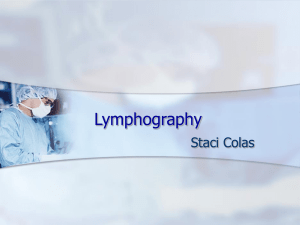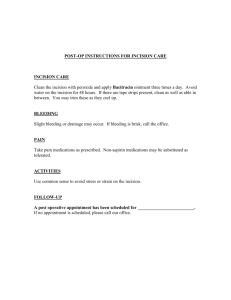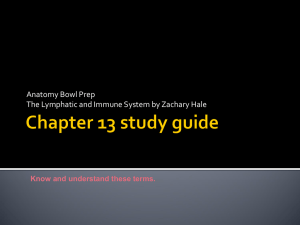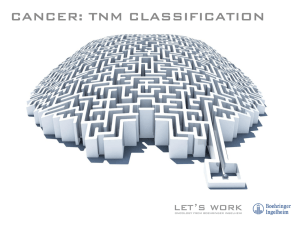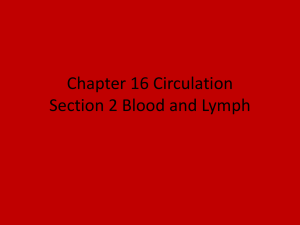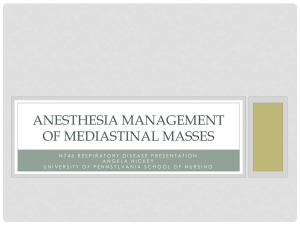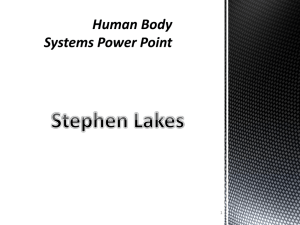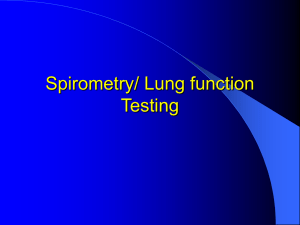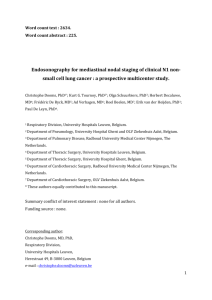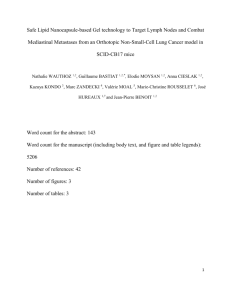Mediastinoscopy
advertisement
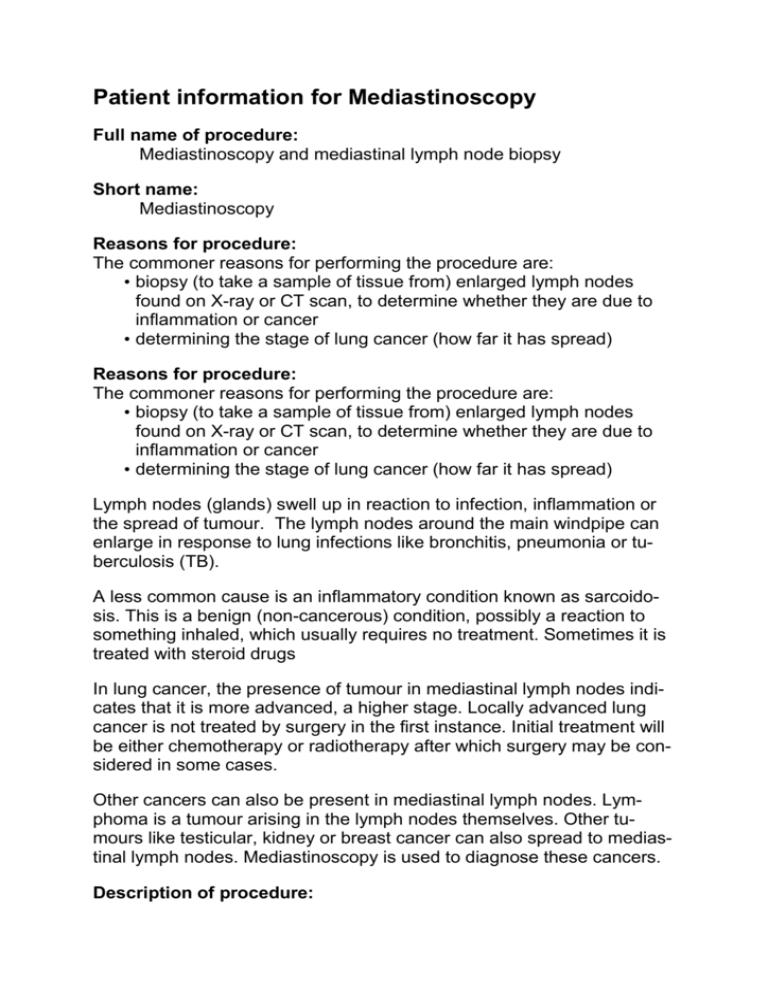
Patient information for Mediastinoscopy Full name of procedure: Mediastinoscopy and mediastinal lymph node biopsy Short name: Mediastinoscopy Reasons for procedure: The commoner reasons for performing the procedure are: • biopsy (to take a sample of tissue from) enlarged lymph nodes found on X-ray or CT scan, to determine whether they are due to inflammation or cancer • determining the stage of lung cancer (how far it has spread) Reasons for procedure: The commoner reasons for performing the procedure are: • biopsy (to take a sample of tissue from) enlarged lymph nodes found on X-ray or CT scan, to determine whether they are due to inflammation or cancer • determining the stage of lung cancer (how far it has spread) Lymph nodes (glands) swell up in reaction to infection, inflammation or the spread of tumour. The lymph nodes around the main windpipe can enlarge in response to lung infections like bronchitis, pneumonia or tuberculosis (TB). A less common cause is an inflammatory condition known as sarcoidosis. This is a benign (non-cancerous) condition, possibly a reaction to something inhaled, which usually requires no treatment. Sometimes it is treated with steroid drugs In lung cancer, the presence of tumour in mediastinal lymph nodes indicates that it is more advanced, a higher stage. Locally advanced lung cancer is not treated by surgery in the first instance. Initial treatment will be either chemotherapy or radiotherapy after which surgery may be considered in some cases. Other cancers can also be present in mediastinal lymph nodes. Lymphoma is a tumour arising in the lymph nodes themselves. Other tumours like testicular, kidney or breast cancer can also spread to mediastinal lymph nodes. Mediastinoscopy is used to diagnose these cancers. Description of procedure: Though this is a form of ‘investigation’ it is a surgical operation. The procedure is performed under general anaesthetic. It is performed through an incision in the neck, an inch and a half (4cm) long, just above the breastbone, similar to a tracheostomy incision. A telescope the diameter of your thumb is introduced through the incision and passed alongside the trachea (windpipe). The tissues of the mediastinum can be teased off the trachea, allowing the telescope to be passed down to the level of the heart. Samples are taken from the lymph nodes around the trachea and sent to the laboratory for examination under a microscope. The procedure takes approximately 30 minutes with an extra 30 minutes for the anaesthetic. Most patients are admitted the evening before surgery and allowed home in the evening after surgery (or the day after if they have not fully recovered). You are advised not to drive home. It is not uncommon to feel stiff and uncomfortable with some nausea in the 48 hours after the procedure. You should be able return to work within a week. Benefits of the procedure: 1. diagnosis of a tumour allowing appropriate treatment 2. diagnosis of an infection, ruling out a cancer and allowing appropriate treatment 3. staging of a lung cancer allowing appropriate planning and coordination of a treatment plan Risks of the procedure: Anaesthetic complications: As with all procedures performed under general anaesthesia, reactions to the anaesthetic can occur. While these are uncommon, the more severe reactions can affect the heart (heart attack or abnormal heart beat), the lungs (asthmatic attack or pneumonia) or the brain (stroke or fit). Complications of the operation: Any procedure performed by a surgeon has risks of injury, complication or death. Complications specific to mediastinoscopy are: 1. Bleeding - a certain amount of bleeding occurs with all surgical procedures and there will be some swelling and bruising around the incision for a few days after. Bleeding is usually not 2. 3. 4. 5. 6. 7. a problem unless you are on drugs which thin the blood (see below), have a hereditary bleeding condition or have kidney or liver failure. Blood transfusion is rarely needed. Thoracotomy or median sternotomy for major bleeding the major blood vessels of the body (the aorta, the pulmonary artery, the vena cava and azygous vein) arise from the heart and pass around the trachea close to where the operation is being performed. It is possible to injure these vessels during the biopsy procedure. This can result in major, immediate blood loss. Controlling this bleeding and repairing injured vessels would require making a much larger incision on the chest, known as a median sternotomy or thoracotomy. While we take careful precautions to avoid this complication and it is very uncommon, it does occur and you need to understand that you could require intensive care. It is possible to die from such major bleeding. Infection - any surgical incision can become infected with inflammation, swelling and discharge. Though neck incisions have a low incidence of infection, the edges of the wound can become inflamed due to contact with surgical instruments and dressings may be required for 1-2 weeks. Air leak - it is possible to develop a leak of air from the lung which is also positioned alongside the trachea. This is treated with the placement of a chest drain, and usually settles in a number of days. Injury to other organs adjacent to the trachea may also occur. The trachea itself may be punctured. This may cause an air leak. If the oesophagus (gullet) is punctured, food will be withheld for a period of time with nutrition being maintained by an intravenous feed Hoarseness - one of the nerves which supplies the voice box (the recurrent laryngeal nerve) runs alongside the trachea. It can be bruised during mediastinoscopy causing hoarseness of the voice. This usually recovers within six weeks but it can be permanent. Postoperative pain: There will be some pain around the incision and some tightness in the chest around the windpipe. Local anaesthetic will be injected around the incisions to tide you through the first 12 - 24 hours. You will be given mild painkilling tablets to take home. Notification of results The results of the biopsies will not be available for approximately a week after the procedure. You will be given an appointment to attend a surgical clinic (or that of your referring doctor) to discuss the results when they are to hand. Arrangements will be made at that stage for whatever further treatment is required. Contact numbers: • Royal Victoria Hospital Thoracic Surgical Ward 4a: 028 90632016 • Belfast City Hospital Thoracic Surgical Ward 5 South: 028 90263649 • Royal Victoria Hospital Thoracic Secretaries: 028 9063 3730/2027 • Warning: If you are taking any drug which thins the blood, this may increase the risk of bleeding. An alternative may need to be prescribed up to two weeks before the procedure and you may need to be admitted earlier than planned. Please advise your surgeon (or contact his secretary) if you are taking any of the following drugs: • Warfarin • Aspirin • Plavix (Clopidogrel) • Drugs for treating arthritis such as : • Voltarol (diclofenac), • Indocid (indomethacin), • Brufen (ibuprofen), • Ketoralac, • Mobic (meloxicam), • Celecoxib, • Advil • Neurofen, • Feldene • Vioxx (rofecoxib) Keywords to search the internet Mediastinoscopy Biopsy Lung cancer stage Lymphoma Hodgkin’s lymphoma Sarcoidosis Tuberculosis Median sternotomy Useful websites http://www.cancer.gov/cancertopics/pdq/treatment/non-small-celllung/Patient http://medicine.creighton.edu/forpatients/mediast/mediastin.html http://www.chclibrary.org/micromed/00056310.html http://www.thoracicsurgery.co.za/operations/mediastinoscopy.htm http://www.nci.nih.gov/cancertopics/wyntk/hodgkins
